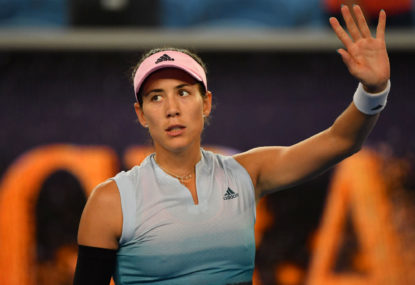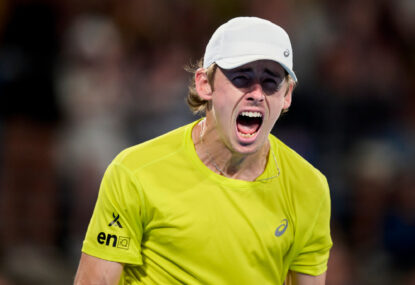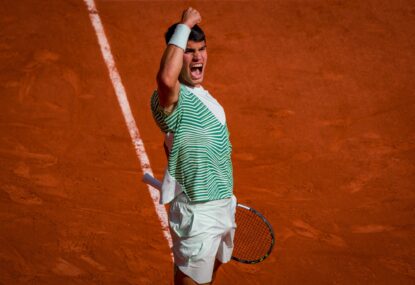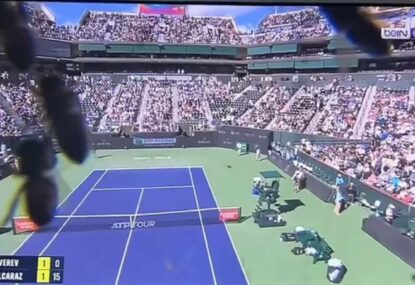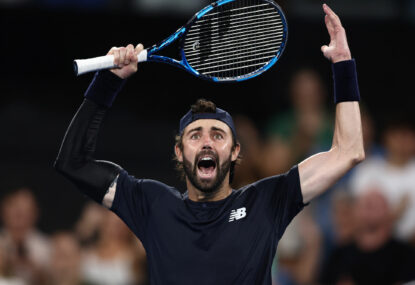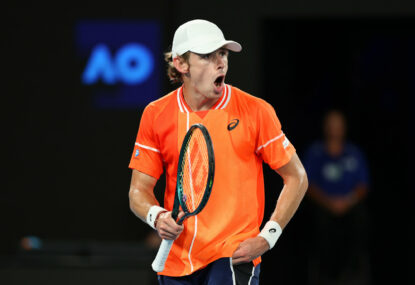With Wimbledon just under a fortnight away, here’s a chance to look back at some of the greatest (and some significant) Wimbledon finals over the past decade.
10. Amelie Mauresmo defeated Justine Henin-Hardenne, 2006
Throughout the middle of the noughties, the biggest rivalry in women’s tennis was the one between underachieving Frenchwoman Amelie Mauresmo and Belgium’s Olympic gold medallist from Athens, Justine Henin-Hardenne.
They met fourteen times, including seven times in championship matches, with Henin-Hardenne leading both categories 8-6 and 5-2 respectively.
This included the gold medal match in Athens, a highlight of their rivalry outside of the Grand Slams.
However, two of Mauresmo’s championship match victories came at the most important time of them all – at the Grand Slam finals.
Mauresmo had earlier won a controversial Australian Open final when Henin-Hardenne retired in the second set at 6-1, 2-0 down due to a stomach bug; this was not the way Mauresmo would have wanted to celebrate winning her first Grand Slam title after seven years of trying.
There is no doubting that this Wimbledon victory was the most special of them all. In any which way, history was going to be made.
Either Mauresmo would become the first French woman since Suzanne Lenglen in 1925 to win tennis’ most prestigious Grand Slam title, or Henin-Hardenne would become the first Belgian to do so.
In the process, she would have become the quickest woman in history to complete a Career Golden Slam, having won the other three Grand Slams, plus the aforementioned gold medal at Athens in 2004.
Henin had previously reached the Wimbledon final as a 19-year-old in 2001, losing in three sets to Venus Williams.
The Belgian appeared halfway to achieving the latter honour when she won the first set 6-2.
But from there, Mauresmo would step up her game and take the next two sets to deny Henin the most prestigious trophy in tennis, while becoming the first Frenchwoman since Lenglen in 1925 to win the title.
Additionally, this was her second Grand Slam title, after triumphing in Australia earlier in the year, but her first after actually completing a match.
The aftermath of this title match had ramifications on both women for the remainder of the careers.
After a three-set loss to eventual champion Maria Sharapova at the 2006 US Open, Mauresmo never progressed past the fourth round of eleven subsequent Grand Slam tournaments, and announced her retirement in 2009, citing burnout.
Henin, on the other hand, never reached the Wimbledon final as the trophy continued to elude her until her retirement.
She had come so close in 2007, but Marion Bartoli played the match of her life in the semi-finals to stop the Belgian from getting to the final that year.
Henin eventually retired in 2011 after suffering an elbow injury against compatriot Kim Clijsters in the fourth round of the 2010 edition.
9. Roger Federer defeated Mark Philippoussis, 2003
A lot has been talked about with Roger Federer’s recent Grand Slam struggles (he has only won two Grand Slam titles since breaking Pete Sampras’ record at Wimbledon in 2009), that almost many people forget where this all started.
Prior to winning his first Grand Slam title at Wimbledon in 2003, Roger Federer had never gone past the quarter-finals of any Grand Slam tournament; his previous best results being a pair of quarter-finals at the French Open and Wimbledon in 2001.
Only Mark Philippoussis, who had previously reached the final of the 1998 US Open, losing to his compatriot, Patrick Rafter, stood in the way of Federer and his first Grand Slam title.
In between his well-documented injuries, Philippoussis was well known for his towering serve and intimidating appearance. Entering the final, the Greek Australian had endured many knee operations and was once told two years ago that he’d never be able to play tennis again.
Philippoussis was unable to force a single break point as Federer laid the foundations for what would eventually become one of the greatest eras ever witnessed in men’s tennis.
Now, Federer has the chance to break further history and become the first man to win eight Wimbledon titles, exactly a decade after his first, and continue to add to his 17 Grand Slam titles.
And how fitting would that be.
8. Serena Williams defeated Agnieszka Radwanska, 2012
Of the five Wimbledon titles Serena Williams has ever won, there is no doubting that she had to work very hard to for this one.
It had been exactly two years since her last Grand Slam title and her career appeared dead after she suffered a cut foot, which contributed to her dropping to No. 175 in the world at the time.
And after a shock first round loss at the French Open it appeared all but certain that Williams was closing in on the end of her career rather than another Grand Slam title.
But at Wimbledon, she proved anything but. Despite being pushed to three sets by Zheng Jie and Yaroslava Shvedova in the preliminary rounds, Serena then showcased her best to end the title defence of Petra Kvitova in the quarter-finals.
She also ended any hopes Victoria Azarenka had of reaching her first Wimbledon final, to finally return to the championship match at a tournament, which she has served gracefully with four singles titles.
On the opposite side of the net would be Poland’s Agnieszka Radwanska, who became the first Pole in the Open Era to reach a Grand Slam final. Radwanska had previously won the girls’ title in 2005.
But it was clear from the beginning that nerves would get the better of her, as she struggled to adjust to the occasion of playing in a maiden Grand Slam final.
In the blink of an eye, Serena would win the first set 6-1 and a regulation Williams victory appeared on the cards. However, Radwanska would fight back to take the next set 7-5 and surprisingly make a contest out of it.
Williams’ class eventually showed in the final set as she took it 6-2, and in the process return to the top four, which, as of today, remains unchanged almost one year on.
Radwanska entered the match battling illness but she was determined to compete, and so she did. But it was clear from the beginning that she would struggle to contain Serena’s game, and if you take away the second set which she won, it could so easily have been a blowout.
However, Radwanska was able to make a challenge out of her first Grand Slam final, which others like Jelena Jankovic and Vera Zvonareva struggled to do on their Major final debuts.
Nevertheless, it was a great learning experience from Radwanska and there is no doubt she will one day become a Grand Slam champion. But just when is the question, given Williams’ never-ending dominance today.
7. Petra Kvitova defeated Maria Sharapova, 2011
Perhaps one of the biggest fairytales at Wimbledon came in 2011, when, for the first time since 2006, neither of the Williams sisters featured in the final, let alone the quarter-finals.
It is this Wimbledon title which will centre around Petra Kvitova for the rest of her playing career.
Prior to 2010, she had never won a senior match on grass in her professional career (save for a third round run at the 2007 girls’ event), but she would make a Cinderella run to the semi-finals where only Serena Williams stopped her from completing that fairytale.
Kvitova was intent on going one better in 2011 and so she did. In the semi-finals, she shrugged off the challenge of Victoria Azarenka in a match which would guarantee a first-time Grand Slam finalist, after Venus Williams was ousted in the fourth round by Tsvetana Pironkova (who would then lose to Kvitova in the quarterfinal).
In the final, she would face Maria Sharapova, the Russian glamour girl who was making her first Wimbledon final since 2004 and first Grand Slam final since a serious shoulder injury sent her ranking plummeting down to World No. 126 by May 2009.
One way or another, a fairytale conclusion to the women’s tournament was guaranteed – either a woman who historically struggled on grass before 2010 would be the champion, or a woman whose career appeared over two years ago would make the most triumphant of returns to the top of the sport.
Ultimately, Kvitova would win 6-4, 6-3, sealing the deal with an ace in the final game. She thus became the first Czech woman since Jana Novotna in 1998 to win Wimbledon, let alone a Grand Slam title.
Despite Sharapova’s defeat, her run to the final signalled her official return to the top of the women’s sport – she would finish the year ranked world No. 4.
6. Novak Djokovic defeated Rafael Nadal, 2011
In the absence of Roger Federer from the Wimbledon final for the second consecutive year, it was the defending champion and the soon-to-be world No. 1 who would take centre stage in the men’s final in 2011.
For the first time, Rafael Nadal was able to enter Wimbledon as the defending champion, after knee tendinitis forced him to concede the title, and his world No. 1 ranking, in 2009.
On the opposite side of the net in 2011, in his bid to defend the Wimbledon title was Novak Djokovic, who claimed the world No. 1 ranking for the first time when he bested Jo-Wilfried Tsonga in the semi-finals.
Djokovic may have already claimed four victories over Nadal in 2011, but the Spaniard had won five previous showdowns against Djokovic in Grand Slams, including at Wimbledon in 2007, when Djokovic had to retire due to injury in the semi-finals.
The Serbian was intent on overturning that poor record, and claimed the first two sets before anyone could really blink. Nadal, though, would get back into the match by taking the third set, but the Serbian’s class would show in the fourth set as he ran away to end Nadal’s 20-match winning streak at the All England Club.
In winning the Wimbledon title, Djokovic would become the first Serbian, male or female, to win the most prestigious Grand Slam title there is to offer, and started his long domination at the top of men’s tennis, which was briefly interrupted for four months last year when Roger Federer took the world No. 1 ranking upon winning his seventh Wimbledon title.
5. Roger Federer defeated Rafael Nadal, 2007
In the midst of the most dominant rivalry in men’s tennis, this is probably the most significant of Federer’s two Grand Slam match victories over Nadal.
And the second consecutive Wimbledon final between these two great rivals was an appropriate conclusion to what had been a weather-ravaged tournament, with one match holding up the entire schedule – Nadal’s Test-cricket-length five-set victory over future rival Robin Soderling, which started on the Saturday and ended on the Wednesday.
This meant that the remainder of all the matches had to be squeezed into the following three days, including all the men’s fourth round, quarter and semi-final matches, thus clogging up the already overloaded schedule.
When it eventually got to the final, it was customary that Federer would be the favourite, even though Nadal had touched him up in Paris a month earlier.
Federer winning the first set in a tie-break may have been an indication of things to come. Nadal was desperate to win his first Wimbledon title, and pushed Federer all the way before succumbing in five sets. This marked the first time in which Federer was pushed to the limit in 13 Grand Slam finals.
This would rank as one of the most crushing defeats in Nadal’s Grand Slam career, along with the 2012 Australian Open final which he lost to Novak Djokovic after leading 4-2 in the final set.
Though Federer eventually equalled Bjorn Borg’s record of five consecutive Wimbledon titles, and just missed out on breaking it (see #1 below), this was one of his most fought-hard for Wimbledon titles, along with his 2009 title (see #2 below).
It also suggested that Federer’s then-never-ending domination at Wimbledon was about to catch up to him.
In five completed editions of the championships since, Federer has never again defeated Nadal at Wimbledon, let alone at any Grand Slam, and has only added two more titles.
Nadal on the other hand also won his two Wimbledon titles in three editions.
4. Venus Williams defeated Lindsay Davenport, 2005
The women’s tournament is not well known for the championship matches, but also for some of the upsets that occur in the early rounds, and the Cinderella stories such as Vera Zvonareva’s recovery from an ankle injury to reach the final in 2010.
But this was no doubt an epic championship match of proportions. It was a rematch of the 2000 final, which Venus won in straight sets to claim her first Grand Slam title.
Both players entered the championship match with equal records in Wimbledon finals – Venus had won the 2000 and 2001 titles, but lost the 2002 and 2003 deciders to her younger sister Serena, while Davenport lost the aforementioned 2000 decider a year after capturing the title in 1999.
The elder of the Americans took the first set 6-2 and appeared headed for a second title at the All England Club when she broke to lead 6-5 in the second set. However, Venus would break her and force a tiebreak, which she would win 7-4.
The final set then had it all. Davenport held a championship point late in the final set, but Venus would use all her fighting qualities to deny her, and break the 1999 champion to serve the match out at 8-7, which she would do without hesitation.
The title was Venus’ fifth Grand Slam title, and her third at the All England Club, restoring order after Maria Sharapova abruptly interrupted the dominance of the Williams sisters by winning the title in 2004.
Two more titles would follow, in 2007 and 2008, before her most recent attempt at a sixth Wimbledon title ended in 2009 with a defeat in the final to Serena.
As for Davenport, she was never the same player after that and she would never reach another Grand Slam final, neither would she reach the quarter-finals at Wimbledon, and ended her career with only three Grand Slam titles.
3. Roger Federer defeated Andy Murray, 2012
This is arguably one of the most historic finals that has ever occurred at Wimbledon, whereby Federer was going for his seventh title at SW19, while Andy Murray was bidding to become the first British male champion since Fred Perry in 1936.
The early exits of Lleyton Hewitt, Nadal and Andy Roddick, the only three active men in the bottom half of the draw to have reached the final at the All England Club, guaranteed a first-time Wimbledon finalist from that half of the draw.
But the top half of the draw was all about Federer. He entered this tournament with a chance to return to the world No. 1 ranking with Djokovic being unable to gain any extra points as he was the defending champion.
Additionally, the pain of losing two straight quarter-finals must have been fresh in his mind, none more so than in 2011 when he coughed up a two-set lead to lose to Jo-Wilfried Tsonga.
There would be no such chokes this time, though in the third round he had to climb from a two-set deficit to beat Julien Benneteau in five sets.
Federer then ended the title defence of Djokovic in the semi-finals to reach his first final at SW19 since capturing the title in 2009 (see #2 below). Opposing him on the opposite side of the net would be Murray, who survived the carnage which claimed Hewitt, Nadal and Roddick, to become the first British man since Bunny Austin in 1938 to reach the final at Wimbledon.
With the whole of Great Britain behind him, Murray would break early en route to taking the first set 6-4. That was the first set he won in a Grand Slam final after falling in three previous attempts without winning a set.
But nerves started to get the better of Murray as Federer would take the next three sets, to ultimately win his seventh title at the All England Club, equalling the record of seven titles held by Pete Sampras.
Despite the loss, Murray won many hearts around the world through his emotional and teary-delivered interview, which was watched and heard by many millions around the world. He accepted his runner-up trophy with the same grace in which Federer did so after he lost the 2008 final to Rafael Nadal (see #1 below).
Four weeks later though, Murray would serve up the best revenge possible – by denying Federer the chance to cap off a Career Golden Grand Slam with an Olympic gold medal, with a clinical straight sets victory in the final at the very same Centre Court, 24 hours after Serena Williams achieved her own Golden Career Slam at the expense of Maria Sharapova.
Though his gold medal at Wimbledon last year may be very significant, there is no doubt that Murray would love to win Wimbledon this year – and it might not be long before that happens.
2. Roger Federer defeated Andy Roddick, 2009
For the third straight year, tennis fans were treated to yet another five-set epic, but as far as epics goes, this was the second straight year in which the match was stretched to epic proportions.
Nadal’s inability to defend the title he won in 2008 (see #1 below) due to knee tendinitis meant that Roger Federer was a chance of reclaiming the World No. 1 ranking, and ended a streak of three consecutive Federer vs. Nadal finals at SW19.
Eventually, it would be Roddick whom Federer would have to defeat if he was to not only win his sixth Wimbledon title, but also break the seven-year-old record of fourteen Grand Slam titles held by Pete Sampras, the most by any man.
Federer had previously defeated Roddick in the 2004 and 2005 finals, before Nadal took the American’s place as the opponent of Federer in the 2006, 2007 and 2008 finals.
What turned out would be yet another epic final, as Roddick let his intentions be known that he wanted to win the Wimbledon title at the third time of asking, by taking the first set 7-5.
Federer would then take the next two sets in tiebreaks, as he would in the 2008 final against Nadal (see #1 below) to take a two-set lead into the fourth set.
The fourth set would be the most one-sided in the match, Roddick taking it 6-3. From there, Roddick could smell a second Grand Slam title to go with his lone US Open success in 2003, while Federer was staring down the barrel of a second straight loss in the Wimbledon final.
Then came the epic and dramatic final set. The first 28 games of the set went to serve, until finally Federer made the breakthrough, breaking to take a 15-14 lead and thus put himself into a position to serve for the title. It would be the only time in which Roddick was broken the entire match.
Eventually, after four hours and seventeen minutes, Federer would take the match with the final set stretching to 16-14. By winning this title, he would break the record of 14 Grand Slam titles held by Sampras, who watched on as Federer took his record.
The Swiss had previously equalled his record, and completed a Career Grand Slam, by winning the French Open a month earlier, aided by Nadal’s fourth round loss to Soderling.
As for Roddick, this defeat appeared to have a psychological effect on him, as he would never reach the final, let alone the quarter-finals, at Wimbledon anymore.
1. Rafael Nadal defeated Roger Federer, 2008
It’s no surprise that this epic final from 2008 tops the list of some of the greatest Wimbledon finals in modern history.
Roger Federer entered Wimbledon in 2008 hoping to become the first man to ever win six Wimbledon titles, and did not drop a set en route to trying to achieve that honour.
For the third consecutive year, Rafael Nadal would be opposing him on the opposite side of the net. This was also the third consecutive year in which Federer and Nadal would oppose each other in both the French Open and Wimbledon finals in the same year.
After losing to Federer for two straight years in the Wimbledon final, many rated Nadal chances of finally breaking through, given the way he dominated Federer in Paris a month earlier (Nadal won the 2008 French Open title by dismantling Federer in the final for the loss of just four games).
Rain delayed the start of the match by more than half an hour, and when play finally got underway at 2:35pm, Nadal wasted no time in taking the first two sets 6-4, 6-4. For the first time since 2002, Federer was staring down the barrel of defeat, but he would not give in, taking a 5-4 lead in the third set before the rain once again gave way and paused the match for 80 minutes, leaving fans on the edge of their seats.
Once the match resumed, Federer survived a ferocious third set tie-break. What followed was the most dramatic set of tennis ever played at Wimbledon – Nadal held several championship points in the fourth set tie-break, but each time Federer would deny him, one of which was saved by a great shot, which sailed past Nadal down the line.
Another rain interruption set in just before 8:00pm local time, further delaying the match by another half hour and threatening to delay the match into a second day. Previously, the equally-as-epic 2001 final had to be pushed back to a Monday after Goran Ivanisevic’s famous five-set semi-final win over Tim Henman required more than one day to complete.
The fifth set seemed never-ending. At various stages during the match, Federer was two points away from a sixth straight Wimbledon title, but Nadal would rally, and finally got himself into a position to serve for the title at 8-7 in the final set.
Finally, after four hours and forty-eight minutes of play, and six hours and forty-three minutes since the first ball was served, Nadal prevailed in five sets, 6-4, 6-4, 6-7 (5-7), 6-7 (8-10), 9-7, to win his first Wimbledon title (and first Grand Slam title outside of the confines of Roland Garros).
This would set the precedence for Nadal to finally unseat Federer at the top of the rankings, and claim the Olympic gold medal in Beijing. Nadal would then later win the 2009 Australian Open, once again over Federer, before knee tendinitis would get the better of him.
He was forced him to concede not only the Wimbledon title he won in 2008, but also the world No. 1 ranking, which he handed back to Federer after the Swiss defeated Andy Roddick in the previously mentioned 2009 epic final.





























































































